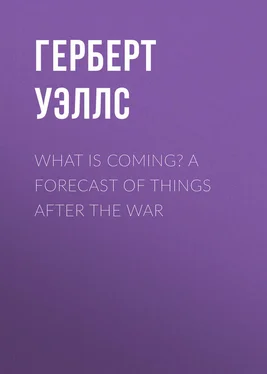This war has brought back into the everyday human life of Europe the great and overriding conception of devotion to a great purpose. But that does not imply clear-headedness in correlating the ways of one's ordinary life with this great purpose. It is no good treating as cynical villainy things that merely exhibit the incapacity of our minds to live consistently.
One Labour paper a month or so ago was contrasting Mr. Asquith's eloquent appeals to the working man to economise and forgo any rise in wages with the photographs that were appearing simultaneously in the smart papers of the very smart marriage of Mr. Asquith's daughter. I submit that by that sort of standard none of us will be blameless. But without any condemnation, it is easy to understand that the initiative to tax almost to extinction large automobiles, wedding dresses, champagne, pâté de foie gras and enclosed parks, instead of gin and water, bank holiday outings and Virginia shag, is less likely to come from the Prime Minister class than from the class of dock labourers. There is an unconscious class war due to habit and insufficient thinking and insufficient sympathy that will play a large part in the distribution of the burthen of the State bankruptcy that is in progress, and in the subsequent readjustment of national life.
And having made this parenthesis, I may perhaps go on to point out the peculiar limitations under which various classes will be approaching the phase of reorganisation, without being accused of making this or that class the villain of an anticipatory drama.
Now, three great classes will certainly resist the valiant reconstruction of economic life with a vigour in exact proportion to their baseness, stupidity and narrowness of outlook. They will, as classes, come up for a moral judgment, on whose verdict the whole future of Western civilisation depends. If they cannot achieve a considerable, an unprecedented display of self-sacrifice, unselfish wisdom, and constructive vigour, if the community as a whole can produce no forces sufficient to restrain their lower tendencies, then the intelligent father had better turn his children's faces towards the New World. For Europe will be busy with social disorder for a century.
The first great class is the class that owns and holds land and land-like claims upon the community, from the Throne downward. This Court and land-holding class cannot go on being rich and living rich during the strains of the coming years. The reconstructing world cannot bear it. Whatever rises in rent may occur through the rise in prices, must go to meet the tremendous needs of the State.
This class, which has so much legislative and administrative power in at least three of the great belligerents-in Great Britain and Germany perhaps most so-must be prepared to see itself taxed, and must be willing to assist in its own taxation to the very limit of its statistical increment. The almost vindictive greed of the landowners that blackened the history of England after Waterloo, and brought Great Britain within sight of revolution, must not be repeated. The British Empire cannot afford a revolution in the face of the Central European Powers. But in the past century there has been an enormous change in men's opinions and consciences about property; whereas we were Individualists, now we are Socialists. The British lord, the German junker, has none of the sense of unqualified rights that his great-grandfather had, and he is aware of a vigour of public criticism that did not exist in the former time…
How far will these men get out of the tradition of their birth and upbringing?
Next comes the great class of lawyers who, through the idiotic method of voting in use in modern democracies, are able practically to rule Great Britain, and who are powerful and influential in all democratic countries.
In order to secure a certain independence and integrity in its courts, Great Britain long ago established the principle of enormously overpaying its judges and lawyers. The natural result has been to give our law courts and the legal profession generally a bias in favour of private wealth against both the public interest and the proletariat. It has also given our higher national education an overwhelming direction towards the training of advocates and against science and constructive statecraft. An ordinary lawyer has no idea of making anything; that tendency has been destroyed in his mind; he waits and sees and takes advantage of opportunity. Everything that can possibly be done in England is done to make our rulers Micawbers and Artful Dodgers.
Конец ознакомительного фрагмента.
Текст предоставлен ООО «ЛитРес».
Прочитайте эту книгу целиком, купив полную легальную версию на ЛитРес.
Безопасно оплатить книгу можно банковской картой Visa, MasterCard, Maestro, со счета мобильного телефона, с платежного терминала, в салоне МТС или Связной, через PayPal, WebMoney, Яндекс.Деньги, QIWI Кошелек, бонусными картами или другим удобным Вам способом.
This chapter was originally a newspaper article. It was written in December, 1915, and published about the middle of January. Some of it has passed from the quality of anticipation to achievement, but I do not see that it needs any material revision on that account.

![Герберт Уэллс - The War of the Worlds [С англо-русским словарем]](/books/26611/gerbert-uells-the-war-of-the-worlds-s-anglo-thumb.webp)










